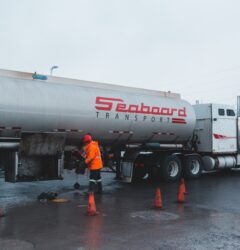14 Sep

As an owner-operated truck driver, you have the freedom of the open road and the opportunity to be your own boss. However, with this independence comes a unique set of tax considerations that you must navigate to ensure compliance and optimize your financial situation. In this article, we’ll explore the key tax considerations that every owner-operator should be aware of.
1. Business Structure
The first tax consideration for owner-operated truck drivers is choosing the right business structure. There are several options, including sole proprietorship, LLC (Limited Liability Company), S Corporation, and C Corporation. The choice you make will impact how your income is taxed, your liability, and the complexity of your tax filings.
- Sole Proprietorship: This is the simplest structure, where your business income is reported on your personal tax return (Form 1040). You’re personally liable for any business debts.
- LLC: An LLC provides some liability protection, and income is typically reported on your personal tax return. It offers flexibility in terms of taxation, as you can choose to be taxed as a sole proprietor, partnership, S Corporation, or C Corporation.
- S Corporation: If you choose S Corporation status, you’ll need to pay yourself a reasonable salary and report it on Form W-2. The remaining profits can be distributed to you as dividends, which may be subject to a lower tax rate than self-employment tax.
- C Corporation: This structure is less common for owner-operators, as it can lead to double taxation (once at the corporate level and again when dividends are distributed to shareholders).
The choice of business structure should align with your business goals and financial situation. Consult with a tax professional or accountant to determine the best fit for your trucking business.
2. Self-Employment Tax
Owner-operators are considered self-employed, which means you’re responsible for paying both the employer and employee portions of Social Security and Medicare taxes, collectively known as self-employment tax. As of my last knowledge update in September 2021, the self-employment tax rate was 15.3% on the first $142,800 of net earnings and 2.9% on earnings over that amount.
It’s important to factor in self-employment tax when setting your rates and managing your finances. Additionally, consider making estimated tax payments to the IRS quarterly to avoid underpayment penalties.
3. Recordkeeping
Effective recordkeeping is essential for tax compliance and managing your finances efficiently. Keep detailed records of income, expenses, and mileage. Common records to maintain include:
- Invoices and receipts for business expenses (fuel, maintenance, tolls, etc.)
- Logbooks or electronic logs for tracking mileage and hours worked
- Bank statements and financial records
- Tax-related documents, such as 1099s from clients
Maintaining organized records will make tax preparation smoother and provide necessary documentation in case of an audit.
4. Deductions and Expenses
Truck drivers have a variety of deductible expenses that can help lower their taxable income. Common deductions include:
- Fuel Costs: Keep receipts for all fuel purchases, and consider using fuel cards to track expenses. You can deduct a portion of your fuel costs based on the percentage of miles driven for business purposes.
- Maintenance and Repairs: Expenses related to maintaining and repairing your truck are deductible. This includes oil changes, tire replacements, and general maintenance.
- Per Diem: Per diem expenses for meals and incidental expenses while on the road can be deducted. The IRS provides standard per diem rates, but you can choose to use actual expenses if they are higher.
- Insurance Premiums: Premiums for trucking insurance, liability insurance, and health insurance may be deductible.
- Depreciation: If you own your truck, you may be able to deduct depreciation expenses over time. Consult with a tax professional to determine the appropriate method for your situation.
- Home Office Deduction: If you have a dedicated home office for administrative tasks related to your trucking business, you may qualify for a home office deduction.
- License and Permit Fees: Fees for licenses and permits necessary for your trucking business are typically deductible.
It’s crucial to keep accurate records of these expenses and consult with a tax professional to ensure you’re maximizing your deductions while staying within IRS guidelines.
5. Meals and Entertainment Expenses
Meals and entertainment expenses are generally subject to specific rules and limitations for tax deductions. You can typically deduct 50% of meal expenses related to your business, provided they are directly associated with your business activities and not extravagant.
To qualify for this deduction, keep detailed records of expenses, including receipts, dates, locations, and the business purpose of the meal or entertainment. Be cautious about deducting personal or excessive expenses, as these can trigger IRS scrutiny.
6. Per Diem vs. Actual Expense Deductions
Truck drivers often face the choice between deducting actual expenses or using the per diem method for meals and incidental expenses. Per diem is simpler and doesn’t require detailed receipts, but it may not always be the most advantageous option.
Using actual expense deductions may result in higher tax savings if your expenses exceed the standard per diem rates. However, it also requires meticulous recordkeeping. Consult with a tax professional to determine which method is more favorable for your specific situation.
7. State Taxes
In addition to federal taxes, owner-operators must consider state taxes. Tax laws vary from state to state, and you may need to file income tax returns in multiple states if you operate across state lines. Some states also have their own fuel taxes and registration fees.
Be sure to research the tax laws in the states where you operate, and consult with a tax professional who is knowledgeable about multi-state tax issues to ensure compliance.
8. Estimated Taxes
To avoid penalties for underpayment of taxes, owner-operators should make quarterly estimated tax payments to the IRS and state tax authorities. These payments are based on your estimated annual income and self-employment tax liability. Failure to make estimated payments can result in penalties and interest.
Consult with a tax professional to calculate and make accurate estimated tax payments throughout the year.
9. Retirement Planning
While managing your day-to-day taxes is essential, it’s also crucial to plan for your long-term financial well-being. Consider setting up retirement accounts, such as an Individual Retirement Account (IRA) or a Simplified Employee Pension (SEP) IRA, to save for your retirement. These accounts offer potential tax advantages while helping you secure your financial future.
10. Consult a Tax Professional
Given the complexity of tax laws and regulations, it’s advisable for owner-operators to consult with a tax professional or accountant who specializes in the transportation industry. They can help you navigate the ever-changing tax landscape, maximize deductions, and ensure compliance with federal and state tax laws.
Owner-operated truck drivers face unique tax considerations that require careful planning and recordkeeping. Choosing the right business structure, understanding self-employment tax, and maximizing deductions are essential steps toward optimizing your tax situation. Additionally, staying informed about tax law changes and consulting with a tax professional can help you achieve financial success on the road while remaining tax-compliant.







